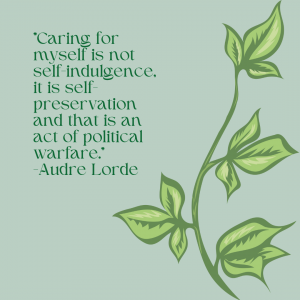This week, we’re taking a look at the concept of self-care and the ways that its definition has changed since the words inception.
The concept of self-care originated in the 1950s among the medical community. The concept of person-centred care was becoming popular in medicine, and medical staff began to think about ways to improve the wellbeing of patients that didn’t involve traditional treatments. Starting in psychiatric institutions, staff would encourage patients to practice self-care by performing tasks like brushing their hair and eating healthily because they believed that it would positively impact their mood and feelings of self-worth. The concept of self-care grew in popularity in psychiatric settings, and continued to spread through various institutions and other long-term care facilities, like care homes and hospices.
As the 1960s progressed, self-care began to grow in popularity among various political activist groups. The Black Panthers, a radical anti-racist organisation, published a chapter on self-care in their political writings, specifically outlining ways in which medical care, childcare, food banks and many other things, could be used to focus on and uplift the wellbeing of the black community. Self-care was beginning to be defined as a political act, and this understanding made its way into other activist groups, notably the woman’s movement. Marginalised people were beginning to view caring for oneself as a corrective act made imperative by the failures of a racist, patriarchal society that didn’t prioritise their wellbeing.
Moving into the 1980s, Audre Lorde was centring black, LGBTQ+ and female voices in her activism and writing, and creating work around the importance of autonomy, reflection and care. Her name and work is synonymous with the history of self-care, and she once famously wrote:
“Caring for myself is not self-indulgence, it is self-preservation and that is an act of political warfare.”
Although, at the time, Lorde’s writing was only recognised and celebrated amongst marginalised communities, her work has become prophetic for modern activists navigating making change and avoiding burnout, and Lorde continued to write and publish work on self-care and radical change until her death in 1992.
The concept of self-care has exploded in popularity in recent years, although it has travelled far from its political and medical roots. These days, you’re likely to stumble across Lorde’s quote in an Instagram infographic, or relayed to you by a health influencer trying to sell you a product that’s sure to ‘change your life’. Self-care has turned into a practice that often involves manicures, make-overs and bubble baths. Although these things can truly be self-care for some, and feel reminiscent of the roots of the medical practice, self-care in the age of the internet is far too often utilised as a marketing strategy. Self-care has been appropriated by the wellness movement and corporate feminism, and is in danger of becoming consumed by the very ideals that it is designed to rail against. Self-care and capitalism work in total opposition to each other, and it is a direct misunderstanding of the term to equate spending time on yourself with spending money. Research done by The Body Shop found that in the UK alone, an estimated £3 billion a month is spent in the name of self-care. It is ignorant to blame individuals for engaging with capitalism in a society that is consumed by it, but it is also important to examine the ways in which modern self-care has become accessible only to the people who have enough time and money to practice it.
To deconstruct our innacurate perception of self-care, we have to re-examine what care truly means to us, and we can find these answers in the place that we started. Medical staff in the 50s encouraging patients to take time to look after themselves through small acts of care; a walk outside, an hour with a book or a favourite meal. That’s not to say that an expensive candle or new pair of pyjamas can’t be self-care, but it’s important to examine whether you’re engaging with the term in a way that is positive for you. You don’t have to spend money or opt into a vicious cycle of self-improvement to care for yourself, on the contrary, sometimes these things can be actively harmful. The Black Panthers championed self-care as a way to reduce burnout but also to support and uplift the community. They acknowledged that to fight for what you believe in, you have to take the time to care for yourself. If you’re thinking of prioritising self-care or making it a part of your daily routine, think back to the roots of the movement, and try not to get wrapped up in the marketing strategies and endless products. Self-care is a way to prioritise your emotional, mental and physical well-being. The optimum way to do this will look different for everyone, but I’m sure we can all agree that we don’t need a £100 candle to make a start.
Thanks for reading! If you enjoyed this post, or it made you feel inspired to write your own, get in touch by emailing maddy@mindwavesnews.com, sending a message on Twitter @mindwaves1, or DMing us on Instagram @mindwaves_scot
If you want to read more of my thoughts on self-care, in a post that is a bit more personal and a bit less shout-y and anti-capitalist (but a lot more ramble-y), click here for a post from last year about looking after yourself in times of stress.



No comments yet.